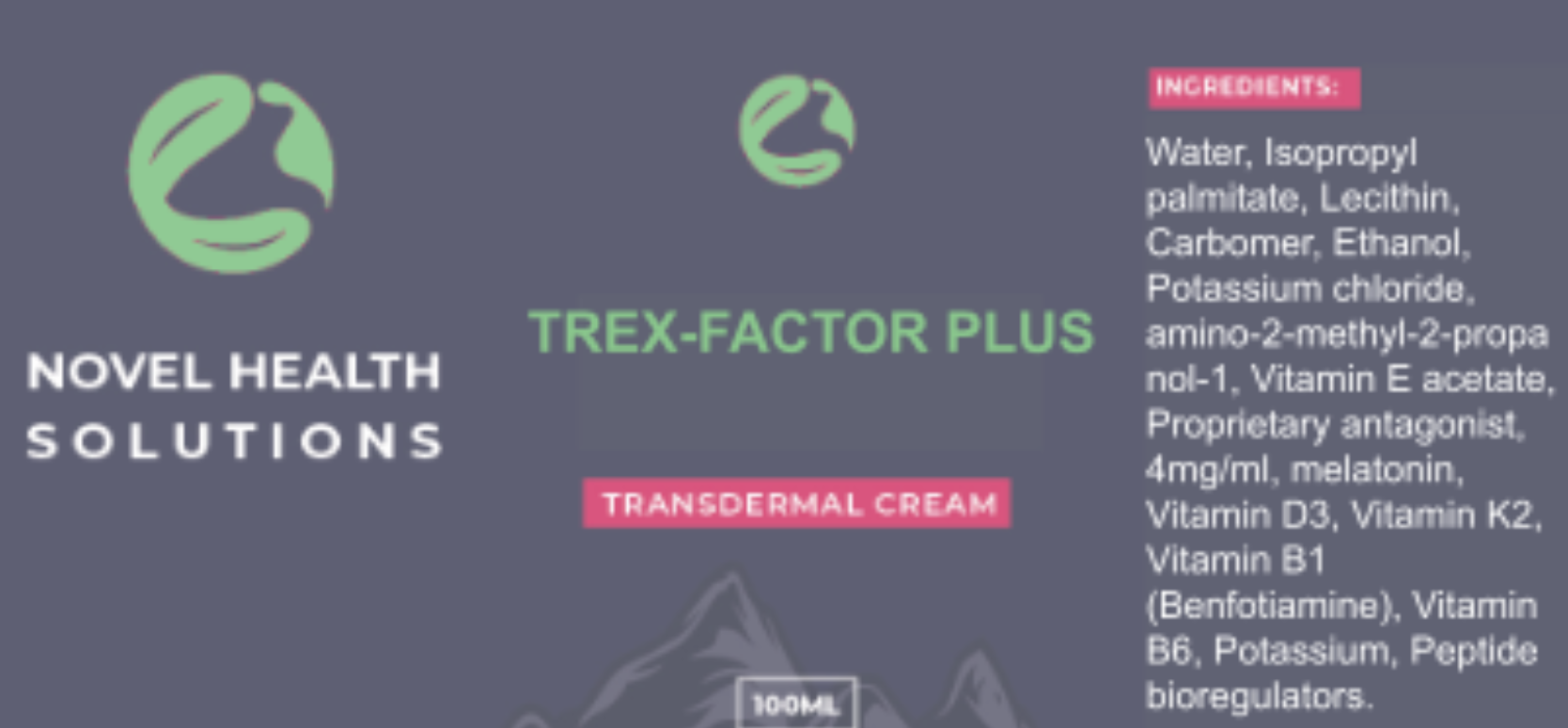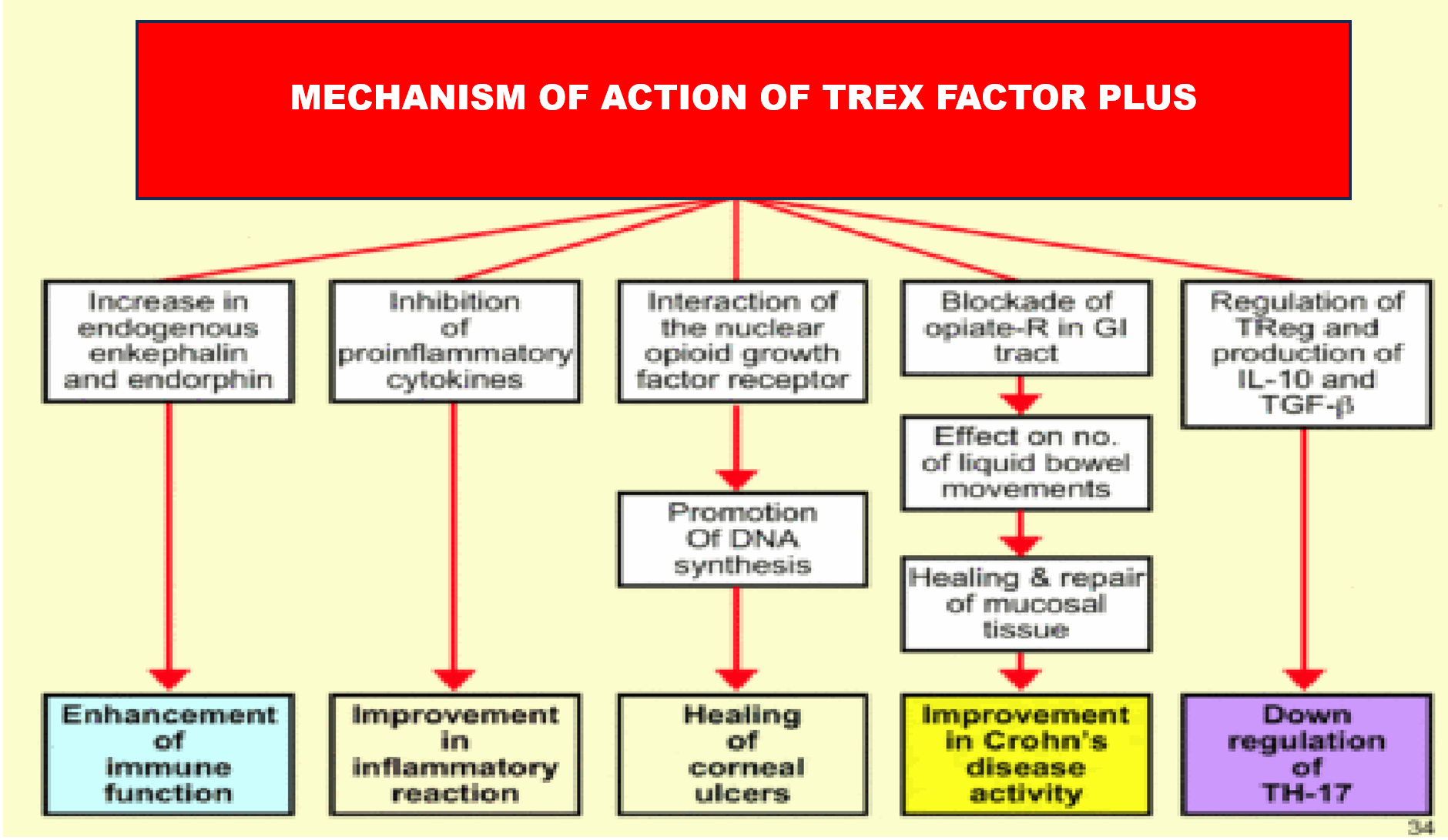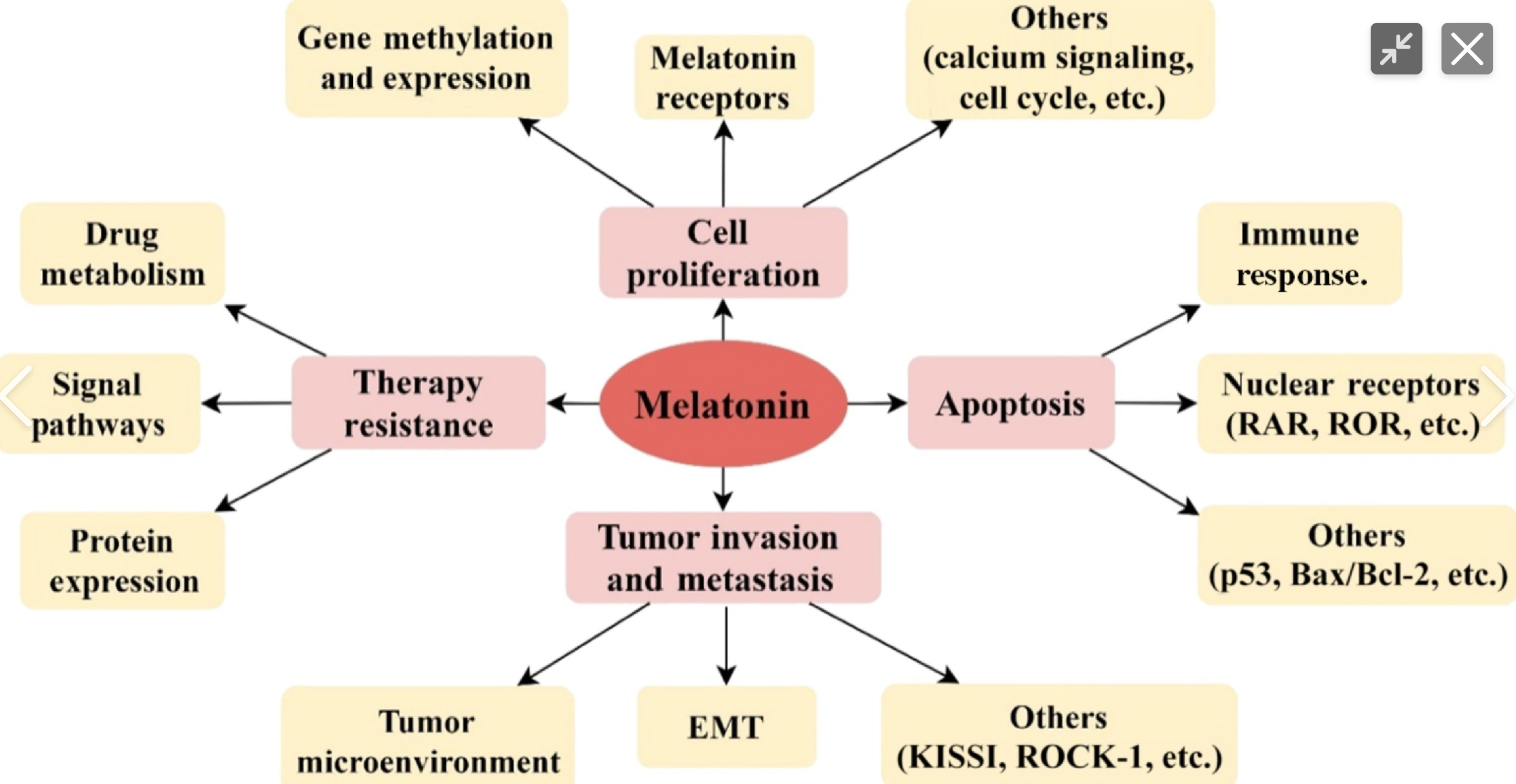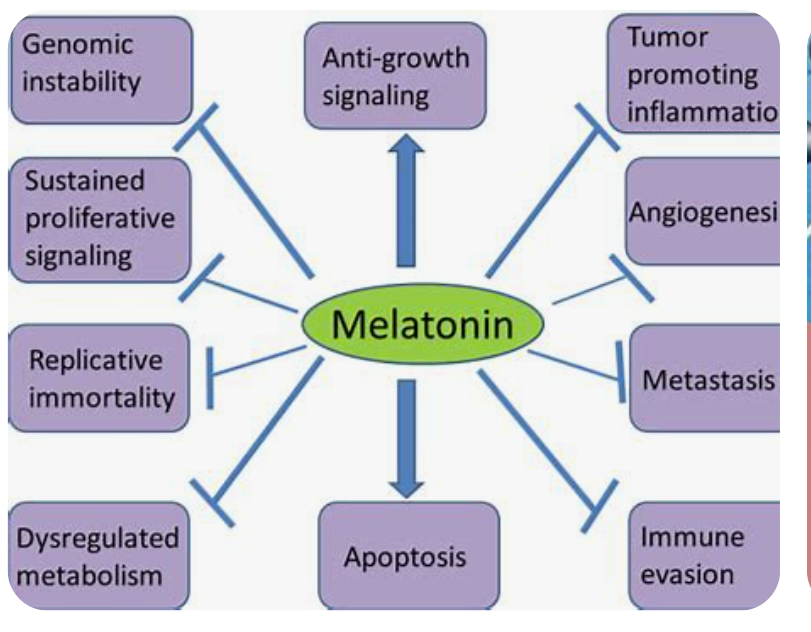TREX FACTOR PLUS 100ML
TREX FACTOR PLUS 100ML
100ML COMPOUNDED TRANSDERMAL:
PROPRIETARY ANTAGONIST
MELATONIN
VITAMIN B1 (BENFOTIAMINE)
VITAMIN D3
VITAMIN K2
POTASSIUM
VITAMIN B6/ P5P
PEPTIDE BIOREGULATORS
Proprietary Antagonist benefit- 2nd picture shown
Vitamin B1 (Benfotiamine)- Source: 10 AMAZING BENEFITS OF VITAMIN B1 THIAMINE (rejuvii.com)
The human body requires 13 different vitamins to thrive and function properly. One of the most important groups of vitamins that helps support this purpose are B vitamins, which consists of eight members: B1, B2, B3, B5, B6, B7, B9 and B12.
B vitamins are important because they help with cognitive function, nervous system and brain health, as well as red blood cell formation. However, one B vitamin, Thiamine (B1), arguably plays the biggest role in our everyday lives.
Thiamine, also known as Vitamin B1, is often called the vitamin of “reassurance of the spirit”. All tissues in the body require this essential nutrient. It is a co-factor in various parts of the body like the skeletal muscles, heart, liver, kidney, and brain.
Vitamin B1 also helps to prevent Alzheimer’s Disease, improve appetite, boost body immunity, treat alcoholism, keep a positive mood, and prevent eye problems.
Impressive health benefits of Vitamin B1 include, but are not limited to:
· Ensures a healthy metabolism - The body needs Vitamin B1 to create ATP, the body’s main energy-carrying molecule. It helps in the conversion of carbohydrates into glucose, which is the preferred source of energy that the body needs to keep the metabolism running smoothly. It also helps break down proteins and fats.
· Boosts immunity - Vitamin B1 is sometimes called an “anti-stress” vitamin because it may strengthen the immune system and improve the body’s ability to withstand stressful conditions. It helps maintain muscle tone along the walls of the digestive tract, a place where much of the immune system is located. The health of the digestive system is extremely important for Vitamin B1 absorption. A healthy digestive tract enables the body to derive nutrients from food better, which are then used to boost immunity and prevent us from getting sick.
· Protects the brain - Thiamine helps bridge the gap between the brain-body connection. It can help defend against a form of brain damage called Cerebellar Syndrome. Vitamin B1 helps with the development of the myelin sheath, a coat that wraps around nerves to protect them from damage and death. Thiamine is also famous for improving concentration power and memory. Thanks to its memory enhancing qualities and ability to positively impact the health of the nervous system, the vitamin is commonly referred to as “morale vitamin”.
· Prevents Alzheimer’s disease - The antioxidant properties of Thiamine can help slow the progression of Alzheimer's disease and dementia. In the brain, Thiamine is required both by the nerve cells and by other supporting cells in the nervous system. Researchers believe that free radical damage is part of what causes these memory conditions and a healthy number of antioxidants could improve the prognosis.
· Promotes cardiovascular health – Our entire cardiovascular system relies on Thiamine to run efficiently and remain healthy.
This vitamin helps in the production of the neurotransmitter acetylcholine, which is used to relay messages between the nerves and muscles and to ensure proper cardiac function. Vitamin B1 deficiency can, therefore, result in irregular cardiac functions. According to research, when Vitamin B1 was administered intravenously for seven days, people suffering from congestive heart failure showed considerable improvements in their echocardiograms, which suggests that it can prevent heart disease.
· Supports eye health - We often take our eye health for granted until we start experiencing visual problems. Research shows that Thiamine seems to benefit ocular health, as it is thought to prevent glaucoma and cataracts. In both glaucoma and cataracts, there is a loss of muscle and nerve signaling between the eyes and the brain. Vitamin B1 stimulates the back-and-forth relaying of these messages and when used along with other essential nutrients, Vitamin B1 can prevent the occurrence of damage to the optic nerve.
· Promotes a better attention span, learning, and memory – Research shows that a deficiency in Thiamine negatively impacts the cerebellum. The cerebellum is a region of the brain that is responsible for a wide variety of functions, including motor control and balance. It also plays a key role in certain cognitive functions, such as attention, fear regulation, language, and procedural memories. Procedural memories are memories of skills learned by an individual that after repetition, have become subconscious – an example – riding a bike. This type of memory is sometimes referred to as "implicit memory", since it is something that becomes second nature. Vitamin B1 deficiency can cause drop-outs of data from the cerebellum’s procedural memory storage.
· Promotes digestion - Thiamine is necessary for secretion of hydrochloric acid, which is essential for the complete digestion of food particles.
· Enhances mood - We all are prone to experiencing less-than-pleasant moods, but those of us with autoimmune diseases and/or mental health issues tend to struggle with elements of mood disorders. A lack of Vitamin B1, in addition to other nutritional deficiencies, can further exacerbate mood-related issues. Thiamine provides the body and mind with a way to cope with physical and mental stress. For this reason, the entire group of B vitamins earned the title of “anti-stress vitamins”. B1 deficiency causes sluggishness since the body requires Thiamine to create energy. With that sluggishness comes a lack of motivation, as well as a lowered mood. Depression and anxiety have been linked to B1 deficiency.
3. Vitamin D3 (also called 25-hydroxyvitamin D)
Source: 10 Surprising Vitamin D Benefits (charmaustin.com)
May improve nervous system/ brain function
May improve immune system
Help with mood stabilization
May promote tissue regeneration
Support digestive system
Bone health support
Help modulate blood pressure
May reduce the risk of heart and dental disease
4. Vitamin K2 (Menaquinone-7)
Source: 9 Vitamin K2 Benefits That Will Improve Your Health (drstevenlin.com)
1. Vitamin K2 may prevent wrinkles and reverse aging
Collagen and elastin are two of the components of skin that give it firmness and elasticity. As skin ages, it loses both collagen and elastin, and its youthful appearance along with them.
Skin cells appear to release matrix-GLA protein to prevent calcification of elastin in the skin.
One study looked at a genetic disorder where premature aging occurs.
It found that elastin is calcified due to the lack of Vitamin K2 activated matrix-GLA protein. Vitamin K2 could help maintain youthful skin activating Matrix-GLA and in turn preventing calcification of elastin.
Pseudoxanthoma elasticum: A condition where the mineralization of skin and premature wrinkles occur.
2. Vitamin K2 to prevent varicose veins
Vitamin K2 activates matrix-Gla protein to mop up calcium in vessels, cardiovascular benefits. Calcification of veins has been shown to be a contributor to varicose veins, so Vitamin K2 may also prevent varicose veins. Varicose veins are not always detrimental to our health but can be unsightly and uncomfortable.
3. Vitamin K2 for blood sugar regulation and type-II diabetes
The second Vitamin K-dependent protein, osteocalcin, may help the body to use insulin. Activated proteins may increase insulin sensitivity, the core problem in type-II diabetes. It should be noted that evidence in this area is conflicting, though; one meta-analysis on this topic showed no effect.
4. Vitamin K2 to increase exercise performance
Bones release osteocalcin during exercise, seemingly sending out messages to help muscles cope with increased energy demands. The Vitamin K2 protein allows skeletal muscle to use energy during exercise, increasing the efficiency of the work out and potential performance.
5. Vitamin K2 and polycystic ovary syndrome (PCOS) – female fertility
Polycystic ovary syndrome is characterized by an overproduction of certain steroids such as testosterone and DHEA sulfate (DHEAS).
One randomized control trial showed that Vitamin D-K-calcium co-supplementation for 8 weeks among Vitamin D-deficient women with PCOS decreased DHEAS levels and testosterone levels.
Vitamin K2 and its role in hormone production could both prevent and help treat polycystic ovary syndrome.
6. Vitamin K2 for low testosterone and male fertility
Vitamin K2 MK-4 is used for steroid production in the male testis. Studies in rats have showed that a diet providing MK-4 75 mg/kg enhanced testosterone levels compared to the control.
7. Vitamin K2 for preventing kidney stones
People with chronic kidney disease and those receiving dialysis are at risk of Vitamin K deficiency.
One risk factor for kidney stones is excess Vitamin D, as demonstrated in lifeguards. But the real problem is that Vitamin D creates a need for Vitamin K2.
Patients with kidney stones secrete matrix-GLA protein in its inactive form. Vitamin K2 deficiency is a major cause of kidney stones. People with polymorphisms for matrix-GLA protein also have higher risk of kidney stones.
8. Vitamin K2 to prevent cancer
Prostate calcification appears to be a significant factor in the development of prostate cancer.
One study on Vitamin K2 indicated that it can reduce the risk of prostate cancer by 63 percent.
In liver cancer, Vitamin K2 supplementation has been shown to help reduce recurrence and delay progression.
9. Vitamin K2 and the brain
The most obvious role of Vitamin K2 on the brain may be prevention of cardiac embolism or stroke. Matrix-GLA protein has a role in preventing stroke due to its cardiovascular benefits.
However, recently, Vitamin K2-dependent proteins have been shown to play a key role in the brain and central and peripheral nervous systems. They may even have an antioxidant role in the brain itself.
Specifically, Vitamin K2 – alongside K1 – seems to act with glutathione to prevent death of nerve cells and brain damage.
Its role could be key in the neuro-degenerative process. Overall, it seems to prevent oxidative stress and inflammation in the brain.
Early studies are also showing that lower intake of Vitamin K relates to Alzheimer’s disease.
Overall, it seems a good dietary intake of Vitamin K2 is vital for optimal brain function and preventing degenerative disease.
4. Potassium
Source: Potassium Benefits, Foods, Deficiency, Supplements and Dosage - Dr. Axe (draxe.com)
Helpful link: https://youtu.be/8kI98hD_Hrs?si=7ZzGOMOtviUaSm0s
“1. Boosts Heart Health
Potassium is absolutely essential to heart health and plays a central role in regulating your heartbeat to ensure that your heart is working efficiently. In fact, if you’re having trouble with your heart rhythm, a potassium deficiency could easily play a role.
Studies show that even minute alterations in potassium levels may be associated with a higher risk of having a slow or fast heart rate, which can increase the risk of even more serious heart problems.
2. Prevents Cramps
One of the main benefits of consuming high-potassium foods and electrolyte drinks is decreased muscle cramping and improved muscle strength. Muscle weakness, muscle aches and muscle cramps are common side effects of low potassium levels.
This is especially common when athletes become dehydrated and don’t consume enough potassium-rich foods before and after exercise. Not only that, but potassium can also be especially beneficial for the treatment of PMS cramps as well.
3. Reduces Risk of Stroke
One of the top potassium benefits is its ability to promote heart health and reduce the risk of stroke. Several observational studies have actually found that those with high potassium levels experience a lower risk of stroke. The risk of ischemic stroke, in particular, is lower in high potassium consumers.
Interestingly enough, a study published in the Journal of the American Heart Association even showed that consuming at least 3,500 milligrams of potassium each day was linked to a lower risk of stroke.
4. Blood Pressure Balance
According to a recently updated publication from Harvard Medical School, “the average American diet delivers too much sodium and too little potassium,” which is highly counterproductive when it comes to discouraging high blood pressure. This is because potassium, in combination with other minerals like calcium and magnesium, prevents fluid from building up in cells. A buildup of fluid within cells is what elevates blood pressure and can result in heart palpitations, narrowed arteries, scarring and poor circulation.
Studies show that a diet high in potassium, especially potassium from fruits and vegetables, can help lower blood pressure. This is especially true if the increase in potassium foods is not accompanied by an increase in high-sodium foods.
5. Improves Cellulite Appearance
Fluid retention is one of the major potential causes of cellulite. Unfortunately, most people consume far too much sodium and not nearly enough potassium. Sodium brings nutrients into your cells whereas potassium helps flush excess waste out of your cells.
For this reason, if you reduce sodium intake and start consuming potassium-rich foods, you could potentially help reduce the appearance of cellulite.
6. Protects Against Osteoporosis
Research has found a direct relationship between bone density and increased intake of dietary potassium. Potassium citrate and bicarbonate, in particular, are two potassium salts that are naturally found in foods high in potassium, and a recent study reveals that these potassium salts can actually improve the health of your bones and ward off osteoporosis.
A 2015 study published in the journal Osteoporosis International found that a high consumption of potassium salts significantly decreases the urinary excretion of both acid and calcium. Why is this significant? Because the potassium salts actually help the bones not to reabsorb acid and also to maintain vital mineral content.
This means that consuming more foods high in potassium could potentially help preserve your bones and prevent serious bone-related health issues like osteoporosis.
7. Supports Healthy Growth and Development
Your body actually requires potassium in order to process and utilize the carbohydrates you consume. As an a child or an adult, you also require potassium to build protein and muscle. If you’re younger in age and your body is still growing, then potassium helps ensure that your growth continues at a normal, healthy rate.”
6. VITAMIN B6 (P5P: pyridoxal-5-phosphate)
SOURCE: 13 Surprising P5P Benefits for Your Health | The Healthy RD
“13 Emerging P5P Benefits
With so many roles in the body, it isn’t too surprising that clinical studies are showing the beneficial effects of P5P and vitamin B6 supplements. Here are the 13 roles we know of today for this key vitamin.
P5P Benefits: Reduces Inflammation
Inflammation is at the root of many chronic illnesses, so much research is focused on the best ways to reduce it. P5P reduces homocysteine, so it logically may reduce inflammation. Here is the research we have so far:
In a large study, B6 supplements at 5 mg/day or more were related to less inflammation.
Supplemental B complex compared to placebo reduced inflammation in 62 patients. These patients had rheumatoid arthritis.
Another study of patients with rheumatoid arthritis found that vitamin B6 supplements at doses of 5 mg per day reduced markers of inflammation, including plasma IL-6 and TNF alpha.
Take home: P5P and B complex supplements help dampen down the inflammatory response in the body.
Vitamin B6 May Reduce Cancer Risk
Cancer risk is affected by the foods we eat and research is finding that vitamin B6 foods may reduce our chances of these deadly diseases. For example:
High dietary intake of B6 may reduce the risk of colon cancer, especially in women who drink alcohol.
Vitamin B6 blood levels are related to a reduced risk of breast cancer in post-menopausal women.
However, vitamin B6 levels in the blood did not seem to be related to stomach or esophageal cancer.
Take home: research in this area remains preliminary but very promising.
Some research shows that the type of folate used affects cancer risk too. Read my blog about folate.
P5P Benefits for Anemia
Anemia makes you feel tired and lose focus. One reason that people can become anemic or have low red blood cell levels is because of vitamin B6 deficiency.
Specifically, a type of anemia called sideroblastic anemia results in abnormally shaped blood cells. This can be caused by several things, one of them being vitamin B6 deficiency.
Vitamin B6 helps resolve anemia in about 50% of the cases of sideroblastic anemia. When unresponsive to treatment, a type of B6 called P5P may help people recover from this condition. This is because P5P, or pyridoxal phosphate, is the active form of B6.
Much lower doses of P5P than other forms of B6 can be given with success in these cases for treating this specific type of anemia.
P5P Vitamin Reduces Seizures
Seizures are debilitating and difficult to treat.
Could some seizures have a simple treatment such as vitamin B6?
Research suggests so. For example, seizures can be caused by a vitamin B6 deficiency. Seizures can appear in infants with specific vitamin B6 gene variances as well.
Vitamin B6 deficiency can also cause seizures in adults. They are more likely to be caused by drug-induced vitamin B6 depletion. Simple supplementation of P5P reverses seizures in these cases.
Vitamin B6 may reduce seizures in patients who do not respond to drug treatment for seizures.
Take home: Inform your healthcare provider of this simple and safe use of vitamin B6 for possible seizure symptom relief.
P5P Benefits for Depression and Brain Health
P5P benefits likely extend to brain health. As you may recall, P5P is involved in all types of energy metabolism. The brain likes energy as do most of the tissues in your body.
A few examples of research related to brain health and vitamin B6 include:
A large study of vitamin B6 with folate and B12 reduced the risk of depression in older adults by 50%.
Low blood levels of vitamin B6 may be related to depressive symptoms.
B6 along with magnesium reduced anxiety-related premenstrual syndrome.
Vitamin B complex reduced brain shrinkage in Alzheimer’s disease patients as well, although more research is needed.
The effects didn’t seem to apply to patients after a stroke, however.
Take home: P5P plays critical roles in neurotransmitter and brain function and may serve to help treat depressive symptoms.
P5P Benefits: May Reduce Kidney Stones
Vitamin B6 plays a role in our kidney health too, especially in reducing kidney stone risk.
We know that a high intake of vitamin B6 (greater than 40 mg per day) may reduce the risk of kidney stones by as much as 65%.
How might B6 reduce the risk? In preclinical work, vitamin B6 reduces urinary oxalate levels by 50%. P5P also reduced kidney damage due to diabetes in a rat study.
Take home: you may want to include P5P as part of your healthy kidney routine.
P5P Vitamin Improves Eye Health
P5P benefits also seem to extend to eye health because it plays a role in the structure of the eye. Here are some of the research we have for P5P and eye health.
A large clinical trial showed that vitamin B6, folate, and B12 reduced macular degeneration risk by 33-41%.
When combining folate, vitamin B12, and vitamin B6 as PLP, eye function was improved in a pilot study of patients with Type 2 diabetes.
Vitamin B6 Reduces PMS Symptoms
Premenstrual syndrome causes a lot of physical and emotional distress. Many people don’t realize that nutrients can make a big difference in this condition. So far, nine clinical studies have shown that vitamin B6 (50-100 mg/day) may reduce symptoms of premenstrual syndrome.
Here are some examples of those studies.
Depressive symptoms seem to be the symptoms that are alleviated most by P5P.
Vitamin B6 reduces symptoms of depression in all of these studies.
The studies were small but consistently effective.
When combined with magnesium, vitamin B6 helped to also reduce water retention symptoms during PMS.
Take home: vitamin B6 foods and even supplements should be included in your diet if you suffer from PMS.
Related post: Can Probiotics Affect Your Periods?
Vitamin B6 for Carpal Tunnel Syndrome Symptoms
As you may recall, vitamin B6 plays a role in the structure of nerves and has long been used for helping to manage these conditions. Now we have several studies that show that P5P helps some of these conditions.
For example:
In a double-blinded, randomized trial of 40 patients, supplemental vitamin B6 reduced symptoms of carpal tunnel syndrome, including pain, numbness, weakness, tingling, and improved sleep.
Patients with severe carpal tunnel syndrome usually have a vitamin B6 deficiency. They often respond to treatment with supplemental vitamin B6.
Vitamin B6 for Other Types of Nerve Pain
Vitamin B6 plays a role in maintaining nerve health, so it may help reduce symptoms of other nerve conditions.
When combined with thiamine, vitamin B6 helped reduce the pain of diabetes called diabetic neuropathy in a clinical study.
P5P Benefits Include Reduced Restlessness
Mood-stabilizing drugs are often in the category of antipsychotic medications or atypical antipsychotic drugs. These are prescribed now more than ever.
One common downside to these medications is symptoms of restlessness and dyskinesia. Research shows that vitamin B6 is helpful in reducing the side effects of antipsychotic medications.
For example, B6 was as effective at treating restlessness as the drug propranolol in a clinical study.
Another pilot study found that vitamin B6 reduced symptoms of restlessness by 80%.
Take home: if you are getting restless legs syndrome from medications, you may benefit from P5P supplements.
Vitamin B6 for Reducing Morning Sickness
Morning sickness is common and very unpleasant. Vitamin B6 safely helps with these symptoms. For example:
Supplemental B6 at 20 mg per day reduced symptoms of nausea and vomiting in pregnant women with morning sickness.
Both ginger and vitamin B6 were effective at reducing vomiting in pregnancy. Ginger was more effective at reducing nausea symptoms.
Another study found ginger and vitamin B6 equally effective in reducing nausea and vomiting in pregnancy (better than placebo).
Vitamin B6 Autism Benefits
While we don’t fully know the cause of autism, many different types of nutrients and foods are proving beneficial for the symptoms of autism. For example:
A comprehensive vitamin and mineral supplementation regimen, including vitamin B6, reduced symptoms of autism compared to a placebo over a 1 year period.
A combination of vitamin B6 and magnesium improved symptoms of autism in 33 children over 6 months. When supplementation stopped, symptoms reappeared.”
*Your results may vary from those listed above.
*These statements have not been evaluated by the Food and Drug Administration.
*This product is not intended to diagnose, treat, cure or prevent any disease.
Since we do not know everything about your medical history and medications, please consult with your health care practitioner before implementing any new protocols and supplements. Do not construe any information listed on this site as a substitute for actual medical advice. The info you receive from us is not intended to replace medical advice by your doctor. Forrest Health, Inc. does not dispense medical advice, prescribe, or diagnose illness. We offer nutritional programs and supplements that support your health. The views and nutritional advice expressed by Natural ReGenesis. are not intended to be a substitute for conventional medical service. If you have a medical condition, see your physician of choice.




